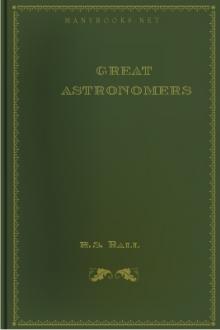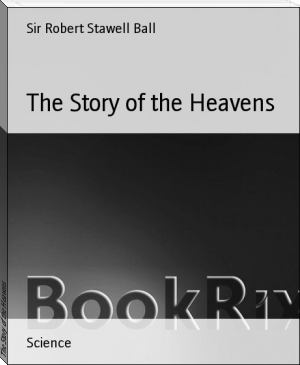Great Astronomers, Robert Stawell Ball [fox in socks read aloud txt] 📗

- Author: Robert Stawell Ball
- Performer: -
Book online «Great Astronomers, Robert Stawell Ball [fox in socks read aloud txt] 📗». Author Robert Stawell Ball
the heavens, we are accustomed to the occasional outbreak of new
stars. It is not, however, believed that any new star which has
ever appeared has displayed the same phenomenal brilliance as was
exhibited by the star of 1572.
This object has a value in astronomy far greater than it
might at first appear. It is true, in one sense, that Tycho
discovered the new star, but it is equally true, in a different
sense, that it was the new star which discovered Tycho. Had it
not been for this opportune apparition, it is quite possible that
Tycho might have found a career in some direction less beneficial
to science than that which he ultimately pursued.
[PLATE: THE OBSERVATORY OF URANIBORG, ISLAND OF HVEN.]
When he reached his home on this memorable evening, Tycho
immediately applied his great quadrant to the measurement of the
place of the new star. His observations were specially directed
to the determination of the distance of the object. He rightly
conjectured that if it were very much nearer to us than the stars
in its vicinity, the distance of the brilliant body might be
determined in a short time by the apparent changes in its distance
from the surrounding points. It was speedily demonstrated that
the new star could not be as near as the moon, by the simple
fact that its apparent place, as compared with the stars in its
neighbourhood, was not appreciably altered when it was observed
below the pole, and again above the pole at an interval of twelve
hours. Such observations were possible, inasmuch as the star was
bright enough to be seen in full daylight. Tycho thus showed
conclusively that the body was so remote that the diameter of the
earth bore an insignificant ratio to the star’s distance. His
success in this respect is the more noteworthy when we find that
many other observers, who studied the same object, came to the
erroneous conclusion that the new star was quite as near as the
moon, or even much nearer. In fact, it may be said, that with
regard to this object Tycho discovered everything which could
possibly have been discovered in the days before telescopes were
invented. He not only proved that the star’s distance was too
great for measurement, but he showed that it had no proper motion
on the heavens. He recorded the successive changes in its
brightness from week to week, as well as the fluctuations in hue
with which the alterations in lustre were accompanied.
It seems, nowadays, strange to find that such thoroughly
scientific observations of the new star as those which Tycho made,
possessed, even in the eyes of the great astronomer himself, a
profound astrological significance. We learn from Dr. Dreyer
that, in Tycho’s opinion, “the star was at first like Venus and
Jupiter, and its effects will therefore, first, be pleasant; but
as it then became like Mars, there will next come a period of
wars, seditions, captivity, and death of princes, and destruction
of cities, together with dryness and fiery meteors in the
air, pestilence, and venomous snakes. Lastly, the star became
like Saturn, and thus will finally come a time of want, death,
imprisonment, and all kinds of sad things!” Ideas of this kind
were, however, universally entertained. It seemed, indeed,
obvious to learned men of that period that such an apparition must
forebode startling events. One of the chief theories then held
was, that just as the Star of Bethlehem announced the first coming
of Christ, so the second coming, and the end of the world, was
heralded by the new star of 1572.
The researches of Tycho on this object were the occasion of his
first appearance as an author. The publication of his book was
however, for some time delayed by the urgent remonstrances of his
friends, who thought it was beneath the dignity of a nobleman to
condescend to write a book. Happily, Tycho determined to brave
the opinion of his order; the book appeared, and was the first of
a series of great astronomical productions from the same pen.
[PLATE: EFFIGY ON TYCHO’S TOMB AT PRAGUE.]
The fame of the noble Dane being now widespread, the King of
Denmark entreated him to return to his native country, and to
deliver a course of lectures on astronomy in the University of
Copenhagen. With some reluctance he consented, and his
introductory oration has been preserved. He dwells, in fervent
language, upon the beauty and the interest of the celestial
phenomena. He points out the imperative necessity of
continuous and systematic observation of the heavenly bodies in
order to extend our knowledge. He appeals to the practical
utility of the science, for what civilised nation could exist
without having the means of measuring time? He sets forth how the
study of these beautiful objects “exalts the mind from earthly
and trivial things to heavenly ones;” and then he winds up by
assuring them that a special use of astronomy is that it enables
us to draw conclusions from the movements in the celestial regions
as to human fate.”
An interesting event, which occurred in 1572, distracted Tycho’s
attention from astronomical matters. He fell in love. The young
girl on whom his affections were set appears to have sprung from
humble origin. Here again his august family friends sought to
dissuade him from a match they thought unsuitable for a nobleman.
But Tycho never gave way in anything. It is suggested that he did
not seek a wife among the highborn dames of his
own rank from the dread that the demands of a fashionable lady
would make too great an inroad on the time that he wished to
devote to science. At all events, Tycho’s union seems to have
been a happy one, and he had a large family of children; none of
whom, however, inherited their father’s talents.
[PLATE: TYCHO’S MURAL QUADRANT PICTURE, URANIBORG.]
Tycho had many scientific friends in Germany, among whom his work
was held in high esteem. The treatment that he there met with
seemed to him so much more encouraging than that which he received
in Denmark that he formed the notion of emigrating to Basle and
making it his permanent abode. A whisper of this intention was
conveyed to the large-hearted King of Denmark, Frederick II. He
wisely realised how great would be the fame which would accrue to
his realm if he could induce Tycho to remain within Danish
territory and carry on there the great work of his life. A
resolution to make a splendid proposal to Tycho was immediately
formed. A noble youth was forthwith despatched as a messenger,
and ordered to travel day and night until he reached Tycho, whom
he was to summon to the king. The astronomer was in bed on the
morning Of 11th February, 1576, when the message was delivered.
Tycho, of course, set off at once and had an audience of the king
at Copenhagen. The astronomer explained that what he wanted was
the means to pursue his studies unmolested, whereupon the king
offered him the Island of Hven, in the Sound near Elsinore.
There he would enjoy all the seclusion that he could desire. The
king further promised that he would provide the funds necessary
for building a house and for founding the greatest observatory
that had ever yet been reared for the study of the heavens. After
due deliberation and consultation with his friends, Tycho accepted
the king’s offer. He was forthwith granted a pension, and a deed
was drawn up formally assigning the Island of Hven to his use all
the days of his life.
The foundation of the famous castle of Uraniborg was laid on 30th
August, 1576. The ceremony was a formal and imposing one, in
accordance with Tycho’s ideas of splendour. A party of scientific
friends had assembled, and the time had been chosen so that the
heavenly bodies were auspiciously placed. Libations of costly
wines were poured forth, and the stone was placed with due
solemnity. The picturesque character of this wonderful temple for
the study of the stars may be seen in the figures with which this
chapter is illustrated.
One of the most remarkable instruments that has ever been employed
in studying the heavens was the mural quadrant which Tycho erected
in one of the apartments of Uraniborg. By its means the altitudes
of the celestial bodies could be observed with much greater
accuracy than had been previously attainable. This wonderful
contrivance is represented on the preceding page. It will be
observed that the walls of the room are adorned by pictures with a
lavishness of decoration not usually to be found in scientific
establishments.
A few years later, when the fame of the observatory at Hven became
more widely spread, a number of young men flocked to Tycho to
study under his direction. He therefore built another observatory
for their use in which the instruments were placed in subterranean
rooms of which only the roofs appeared above the ground. There
was a wonderful poetical inscription over the entrance to this
underground observatory, expressing the astonishment of Urania at
finding, even in the interior of the earth, a cavern devoted to
the study of the heavens. Tycho was indeed always fond of
versifying, and he lost no opportunity of indulging this taste
whenever an occasion presented itself.
Around the walls of the subterranean observatory were the pictures
of eight astronomers, each with a suitable inscription—one of
these of course represented Tycho himself, and beneath were
written words to the effect that posterity should judge of his work.
The eighth picture depicted an astronomer who has not yet come into
existence. Tychonides was his name, and the inscription presses
the modest hope that when he does appear he will be worthy of his
great predecessor. The vast expenses incurred in the erection and
the maintenance of this strange establishment were defrayed by a
succession of grants from the royal purse.
For twenty years Tycho laboured hard at Uraniborg in the pursuit
of science. His work mainly consisted in the determination of
the places of the moon, the planets, and the stars on the
celestial sphere. The extraordinary pains taken by Tycho
to have his observations as accurate as his instruments would
permit, have justly entitled him to the admiration of all
succeeding astronomers. His island home provided the means of
recreation as well as a place for work. He was surrounded by his
family, troops of friends were not wanting, and a pet dwarf seems
to have been an inmate of his curious residence. By way of change
from his astronomical labours he used frequently to work with his
students in his chemical laboratory. It is not indeed known what
particular problems in chemistry occupied his attention. We are
told, however, that he engaged largely in the production of
medicines, and as these appear to have been dispensed gratuitously
there was no lack of patients.
Tycho’s imperious and grasping character frequently brought him
into difficulties, which seem to have increased with his advancing
years. He had ill-treated one of his tenants on Hven, and an
adverse decision by the courts seems to have greatly exasperated
the astronomer. Serious changes also took place in his relations
to the court at Copenhagen. When the young king was crowned in
1596, he reversed the policy of his predecessor with reference to
Hven. The liberal allowances to Tycho were one after another
withdrawn, and finally even his pension was stopped. Tycho
accordingly abandoned Hven in a tumult of rage and mortification.
A few years later we find him in Bohemia a prematurely aged man,
and he died on the 24th October, 1601.
GALILEO.
Among the ranks of the great astronomers it would be difficult
to find one whose life presents more interesting features





Comments (0)